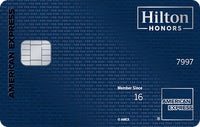What are co-branded credit cards?




Key takeaways
- Co-branded credit cards are issued by a financial institution — usually a bank or credit union — in partnership with a company, organization or brand.
- Examples of co-branded credit cards include airline, hotel and retail credit cards.
- A co-branded credit card might be right for you if you’re loyal to a particular brand and want to earn and redeem rewards with that brand.
Many global airlines, hotel chains and retailers partner with banks to issue co-branded credit cards that reward customer loyalty. These types of credit cards are extremely popular, rewarding cardholders with exclusive cash back or points, discounts and benefits with their favorite brands.
In addition to co-branded cards from major travel companies, you’ll find relative newcomers like Instacart and DoorDash that also want space for their cards in your wallet. Here’s what to look for in a co-branded credit card and whether you can benefit from one or not.
What is a co-branded credit card?
Co-branded credit cards are issued by a financial institution — usually a bank, but it can also be a credit union or fintech company — along with another company, organization or brand. These credit cards usually offer specific rewards and benefits associated with the brand. For example, you might earn rewards or receive exclusive discounts, free shipping and other perks.
You can generally use co-branded credit cards anywhere credit cards are accepted. This makes co-branded cards slightly different from their closed-loop store card cousins, which can only be used for purchases from a specific chain of stores.
Pros and cons of co-branded credit cards
There are plenty of pros to getting a co-branded credit card, especially if you spend a lot of money with a specific brand. Katie Kelton, a senior credit card writer at Bankrate, flies almost exclusively with Southwest Airlines and uses the co-branded Southwest Rapid Rewards® Priority Credit Card to scoop up exclusive perks and benefits.
“What can I say? I love the free checked bags and my free snack. Plus, I’ve lived in and travel often to several Southwest hubs. I’m willing to pay the $149 fee because you get a $75 annual travel credit, which I definitely use. You also get four free upgraded boardings, which is helpful for those times I forget to check in right away and end up with a lousy boarding position.”
— Katie Kelton Senior credit card writer, Bankrate
Kelton’s only gripe about her co-branded card is that the coveted Southwest Companion Pass is just out of reach.
To Kelton’s point, there will always be pros and cons of any credit card, even co-branded cards. Make sure your pros outweigh the cons.

Pros
- Exclusive rewards, discounts and other valuable benefits with a specific brand.
- Co-branded credit cards, like airline or hotel credit cards, can help cardmembers achieve elite status that unlocks more perks.
- It might be slightly easier to be approved for a co-branded credit card — though it’s never a guarantee.

Cons
- Where you can earn or spend rewards might be limited if it’s a brand-specific co-branded card
- You might be tempted to overspend to earn or redeem exclusive rewards
- Companies can devalue rewards at any time without a warning
Best co-branded credit cards
Co-branded cards are often included as some of the best credit cards because of the extensive rewards and benefits they provide to brand loyalists. Here are some of the best co-branded credit cards this year.

Prime Visa
-
The Prime Visa card comes with an Amazon gift card of $150 upon approval. For rewards, Amazon Prime members earn 5 percent back at Amazon.com, Amazon Fresh, Whole Foods Market; 2 percent back at restaurants and gas stations, as well as on local transit and commuting; and 1 percent back on all other purchases.
There’s no annual fee or foreign transaction fees with this card, but you must be an Amazon Prime member to get the most value (membership is currently $139 per year). You probably won’t buy a Prime membership because of the card, but if you’re already a Prime member, this card can be beneficial.

Hilton Honors American Express Aspire Card
-
The Hilton Honors American Express Aspire Card* is often considered one of the best hotel credit cards, despite a high $550 annual fee. It offers complimentary Diamond status — the most elite Hilton status — which unlocks daily food and beverage credits or continental breakfast (varies by brand and region), Executive lounge access (where available), free premium Wii-Fi and numerous other perks.
New cardmembers can earn a welcome bonus of 150,000 Hilton Honors points after spending $6,000 within the first six months of card membership. Cardmembers also earn 14X points at participating Hilton hotels and resorts within the Hilton portfolio, 7X points on flights booked directly with airlines or through the American Express Travel portal and on car rentals booked directly with select car rental companies, 7X points at U.S. restaurants, and 3X points on other eligible purchases.
If you’re a Hilton fan, you’ll appreciate how tightly this card is packed with valuable goodies that make the annual fee more manageable. Some of the perks you’ll get include
- $400 Hilton Resort credit ($200 statement credit twice annually)
- $200 flight credit ($50 per quarter)
- one annual free night reward after renewing your card each year
- $209 CLEAR® Plus Credit
- $100 property credit at Waldorf Astoria Hotels & Resorts and Conrad Hotels & Resorts

Citi® / AAdvantage® Platinum Select® World Elite Mastercard®
-
The Citi® / AAdvantage® Platinum Select® World Elite Mastercard®* is one of the best — if not the best — airline credit cards thanks to all that it offers, but you’d need to fly American Airlines fairly often to take full advantage of it. It comes with a $0 intro annual fee for the first year (and a $99 annual fee after that), and you’re eligible for a welcome bonus of 80,000 points after spending $3,500 within the first four months of card membership.
For rewards, you’ll earn 2X miles on eligible American Airlines purchases, 2X miles at gas stations and restaurants and 1X miles on all other eligible purchases. As for some of this card’s benefits, you’ll get your first checked bag free on domestic flights (for yourself and up to four companions traveling together on the same reservation), preferred boarding and 25 percent off eligible in-flight food and beverage purchases.
Should you get a co-branded credit card?
It depends. If you have a favorite store (or three), a preferred hotel chain or an airline you always fly with, then a co-branded credit card with your preferred brand could save you money, provide you with valuable perks and get you closer to your next goal — whether it’s a big-ticket purchase or pampering yourself at a five-star resort.
Getting the most out of your co-branded card
From picking the best rewards card for your lifestyle to squeezing the most value out of it, here’s how to maximize your next co-branded credit card.
- Be picky. Carefully consider a co-branded credit card’s benefits to find the best fit with your spending, budget and goals. Some issuers offer several cards with different terms and tiered benefits. For example, American Express offers several credit cards in partnership with Marriott Bonvoy.
- Pay off your bills in full and on time. Make sure to pay off your balances in full every billing cycle. Many co-branded credit cards come with higher APRs than traditional credit cards, and paying interest on balances you carry over month to month will eat into any rewards, benefits and savings you’re hoping to gain from the card. Strictly speaking, this rule applies to all types of credit cards, co-branded or otherwise.
- Combine it with other cards. For more experienced cardholders, you may find it more useful to use your co-branded card alongside another card. Ideally this would be a credit card that earns more on the rewards categories that your co-branded card doesn’t cover.
- Don’t feel obligated to spend on the card. In addition to interest, consider other potential costs. Having a co-branded credit card may sometimes nudge you into spending more to get the most rewards, even if you don’t have the budget for it. For example, you might find a cheaper flight with an airline that isn’t covered by your card, but feel pressure to earn miles with your chosen airline despite the price difference. It’s not a big deal when you have this dilemma only now and then, but if you face a choice like this fairly often, then a flexible travel rewards credit card might be a better option.
Combining cards is a bread-and-butter strategy for earning big on rewards cards, especially travel cards. For example, Kelton uses her Southwest Rapid Rewards Priority card in conjunction with a cash back card.
“I swipe my Southwest card for travel purchases — naturally — as well as for ride sharing, airport parking, streaming services and any other purchase that doesn’t earn more than 1 percent cash back with my cash back card,” she says.
“Since my cash back card gives me extra rewards on dining, entertainment and groceries, I don’t usually pay for those things with my Southwest card,” she continues. “But for any other purchase, my top priority is points. I love flying for free!”
The bottom line
Co-branded credit cards can offer a great way to save money and earn rewards and perks, but only if you’re loyal to a particular retailer, airline or hotel chain. Even then, it’s important to carefully consider annual fees, interest rates and other associated costs with a co-branded card before applying. If you decide to get a co-branded credit card, prioritize paying off the balance in full each month to avoid fees and interest that can eat into your savings.
FAQs
*Information about the Hilton Honors American Express Aspire Card and Citi® / AAdvantage® Platinum Select® World Elite Mastercard® has been collected independently by Bankrate and has not been reviewed or approved by the issuer.
Why we ask for feedback Your feedback helps us improve our content and services. It takes less than a minute to complete.
Your responses are anonymous and will only be used for improving our website.
You may also like

Best 2% cash back credit cards

Best cards for a 600 credit score

Best business balance transfer cards


